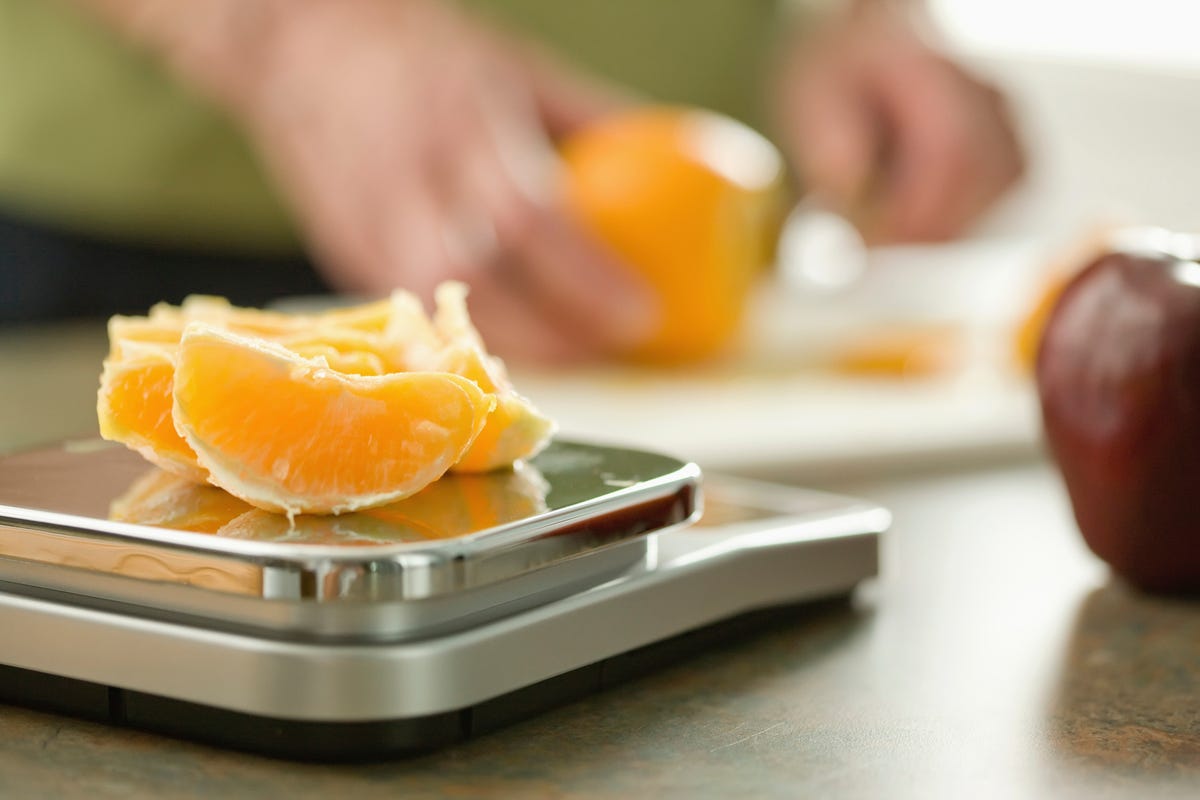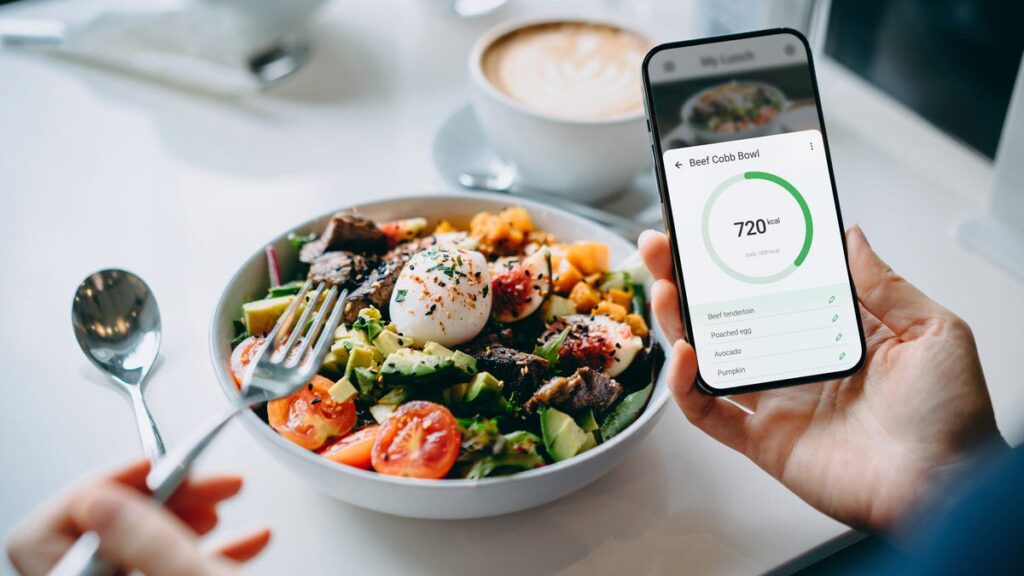Just last night I was googling how many calories a peach has. I don’t necessarily care, but since peaches are in season and I eat them greedily at every meal, and I’m constantly amazed at how filling a single peach can be, I thought I’d look up their nutritional value to satisfy my own curiosity Heart. Google search results vary, ranging from 50 calories to 68 calories to 100 calories in a single fruit. After sifting through more than 10 articles, I simply gave up on finding a reliable answer.
For years I was convinced that weight loss and overall health was simply a matter of taking in less calories than you burned. Considering my internet searches last night, I realize it’s not that simple.

Calorie counting is generally considered an effective method of quantitatively measuring nutrition. Apps like MyFitnessPal and noum Their brand is built around determining the number of calories in a Starbucks Grande Vanilla Latte (250) or a banana for breakfast (105), with the stated purpose of helping users lose weight or get in shape by maintaining a calorie deficit. But is counting calories really a valid approach?
Like many trends emerging in health and wellness, we need to critically evaluate the promised benefits and potential harms. Self-proclaimed health experts on social media sites like Instagram and TikTok say (with a hint of “blah”) that weight loss is just a matter of calories in versus calories out. Depending on where you look, research may deny or affirm the validity of calorie counting. To find out, I spoke with an expert, David Gaviria, a doctoral student in the Department of Nutrition at the University of North Carolina at Chapel Hill.
What is calorie counting?
Calories represent the nutritional value of a specific food or drink, but in the simplest terms, a calorie is a unit of energy. Calories are a unit of measurement used to describe how much energy is consumed or expended in a day. They are necessary to keep us alive and to keep our organs functioning. Calories fuel your body’s functions and movements, whether it’s breathing, sprinting a mile, or digesting food.
It’s true that to lose weight, you have to burn more calories than you consume, and you can do this by changing your eating habits and increasing exercise. For many people who are losing weight, the practice of self-monitoring every calorie consumed and burned throughout the day is an effective way to stay within a target calorie count to achieve health or weight goals.
The popularity of calorie counting is actually a result of diet culture, Gaviria said. While some people, such as athletes, may need to rely on calorie counting to ensure they are consuming enough energy to meet a rigorous exercise program, this is primarily to control weight status.
“Counting calories is not a natural thing,” Gaviria said. “We eat food, not calories. Yes, our bodies convert food into calories for daily functions, but really that’s just a quantification, a number, that helps people basically keep eating or maintain weight”.

The size of produce can change the calorie count, making it difficult to track calories accurately.
What are the potential dangers of calorie counting?
While tracking daily calories can be a tool for losing weight or making sure you’re fueling your body correctly, it’s not a practice for everyone. For some, it’s about making a contribution eating disorder and eating disorders.
This doesn’t mean counting calories cannot Helpful, but it depends on the individual—including their health history and emotional relationship with food and their body. Dangers can arise when counting calories, so it’s important to understand the potential dangers and warning signs to be aware of.
Accuracy is almost impossible
Accurately tracking your calorie intake is notoriously difficult. First, it’s hard to know how many calories are in the food you’re eating. Although there are several online food calorie counting directories, getting precise numbers is still not easy. For example, if you’re looking for the calories in half a cup of rice, the number will be different whether the rice is cooked or uncooked. It’s even harder with fruits and vegetables – if a banana contains 105 calories, how big is that banana? Since there are so many sizes, each size has a different calorie content.
“You have to essentially know exactly how many calories are in the food you’re eating, and that’s hard to do without being more granular by weighing and measuring,” Gaviria said. “Not to mention It’s very time consuming, it takes up a lot of brain space like, ‘Okay, well, if I need to eat this meal and I only have 500 calories left, what can I do with 500 calories?

Careful weighing and measuring is required to accurately track calories.
In addition to trying to guess the calories in a given portion size and planning daily meals to reduce to a specific number of calories, remembering to track every calorie can also be taxing.
Many people forget to keep track of the oil or butter they use to stir-fry, or the condiments they add to their sandwiches or the dressings they add to their salads. If you’re eating on the go, it’s easy to skip tracking a full meal. Even simple omissions can add 500 to 700 uncounted calories.
Links to eating disorders and compulsive stalking
While many people use calorie counting safely, this practice can lead to food restriction beyond healthy limits or encourage disordered eating. Calorie tracking is definitely not recommended for people with a history of eating disorders and weight or body imbalances, as it may exacerbate symptoms and lead to a negative relationship with food.
A study conducted in 2017 found that of 105 people diagnosed with eating disorders, 75% revealed they used an app (MyFitnessPal) to count calories, and 73% said they believed the app Leading to eating disorder symptoms. While not all calorie tracker users will experience unhealthy side effects, there are studies that suggest it may lead to dietary restrictions, imbalances, or may be associated with higher eating disorder pathology.
“Some people think that the research on calorie tracking shows that it may put people at risk for eating disorders or compulsive tracking, but others think that this study shows that’s not the case,” Gaviria said. “I Think this goes back to the individual and their own situation. People need to take the time to realize if this is a good process for them, and if they do start doing it, when will they realize it is not a good process?

Feeling guilt, shame, or anxiety are signs that calorie tracking is becoming harmful.
When should you stop counting calories?
At some point, you may try counting calories out of curiosity or to lose weight. As Gaviria says, if you do decide to use calorie tracking regularly, it’s important to know when to stop.
Feeling guilt, shame, or anxiety are signs that calorie tracking is becoming harmful and you should stop immediately. If you find yourself thinking about food a lot, or worrying about your future food choices throughout the day and how that will fit into your calorie allocation, you should consider stopping. If you feel the need to log calories while cooking or eating, this may be a sign that you have compulsive logging.
The biggest indicator you need to stop tracking, Gaviria says, is if you’re invited out to eat and the first thing you think about is your calorie window.
“If you start turning down social situations that you used to enjoy attending because it doesn’t fit your calories, that’s a really big sign that you should rethink what you’re doing,” Gaviria says.
Symptoms can also manifest physically, not just psychologically. Gaviria explains that if you suddenly lose your appetite or hunger during the day, it could be a sign that you’re not listening to your body. Lack of energy, difficulty sleeping, fatigue, and cessation of menstrual cycles are the main signs that menstruation has stopped. Sometimes it’s easier to spot the physical signs before noticing what’s going on psychologically.

If you track calories and other health metrics, it’s important to maintain a healthy relationship with diet and exercise.
Is there really a safe way to count calories?
Many people find counting calories to be an effective way to maintain a calorie deficit and lose weight. CNET already has A guide to safe calorie counting methods backed by experts If you choose to do this, it’s important to remember that weight and shape are not the only indicators of your health. In fact, there are Many other metrics that are more important to your overall health In addition to weight, include genetics, medical care and mental health.
If you choose to track calories, it’s wise to understand that this isn’t your final solution. Any change in the body takes time and patience. If you’re tracking safely, you’ll still eat the foods you love, even if it means going over your calorie count—and you won’t feel ashamed. Instead of denying yourself, it is better to Be careful about what you choose to eat.
“There are some healthy ways to do this,” Gaviria said. “But I think the moral of the story is to use calorie tracking in moderation while still allowing yourself to enjoy the important things in life, rather than avoiding things that are important to you just because of the calories.”
Remember, health doesn’t have to be complicated. A healthy, nutritious diet can be achieved by eating more fruits and vegetables, whole grains, lean protein Drink water, engage in physical activity, reduce stress and get enough sunlight. These basic changes can help you feel healthy, and you’ll start to notice an overall difference.

